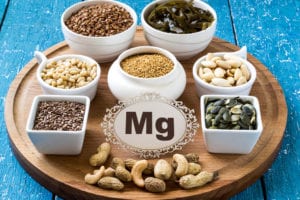Written by Joyce Smith, BS. Supplementation with a combination of magnesium and vitamin B6 was superior to supplementation with magnesium alone only in study participants who reported severe or extremely severe stress levels.
 Magnesium, an essential mineral, is the second most prevalent cation in our cells 1,2. As an enzymatic cofactor involved in over 600 biochemical reactions 1 it can, when present in the body in low concentrations, increase the release of stress-associated hormones such as cortisol. These stress hormones when released can perpetuate a cycle of increased stress and decreased magnesium levels 3,4. While a previous trial found an association between low serum magnesium levels and increased perceived stress in healthy women 5. A current phase (IV) clinical trial by Pouteau et al, 2018 is the first randomized trial 6 to evaluate the effects of a combination magnesium and vitamin B6 supplementation on perceived stress.
Magnesium, an essential mineral, is the second most prevalent cation in our cells 1,2. As an enzymatic cofactor involved in over 600 biochemical reactions 1 it can, when present in the body in low concentrations, increase the release of stress-associated hormones such as cortisol. These stress hormones when released can perpetuate a cycle of increased stress and decreased magnesium levels 3,4. While a previous trial found an association between low serum magnesium levels and increased perceived stress in healthy women 5. A current phase (IV) clinical trial by Pouteau et al, 2018 is the first randomized trial 6 to evaluate the effects of a combination magnesium and vitamin B6 supplementation on perceived stress.
The study enrolled 264 otherwise healthy adults in France, 61% of whom reported severe or extremely severe stress levels at study entry. Participants (mean age of 31.6 years old and 74% women) also had low blood levels of magnesium. They were allocated to receiving either 470 mg magnesium plus 30 mg vitamin B6 per day (n=132) or just 465.4 mg of magnesium (n=132) daily for eight weeks. Their stress levels were assessed using the Depression Anxiety Stress Scales (DASS-42) self-assessment tool 7, consisting of a clinically validated questionnaire that includes three subscales designed to measure negative emotional states of depression, anxiety and stress 7.
Results revealed that the study population experienced rapid stress reductions from taking magnesium alone or magnesium with vitamin B6 over the 8-week period; overall the reduction rate was approximately 40%. Even more promising, the study participants who reported severe or extremely severe stress levels at study entry and who took magnesium in combination with vitamin B6 demonstrated a 24% stronger and significantly positive effect in stress reduction after eight weeks. This trend was also observed at four weeks.
These findings suggest that in healthy adults with low magnesium levels, oral Mg supplementation alleviated the response to perceived stress and that the addition of vitamin B6 to Mg was not superior to Mg supplementation alone. However, with respect to subjects with severe or extremely severe stress, this study provides clinical support for a greater benefit of Mg combined with vitamin B6.
It should be noted that while magnesium and vitamin B6 when give in combination may offer consumers an important benefit for severe stress, in an ideal world, removing the reasons for stress is infinitely more effective than taking supplements and continuing the stressful events or lifestyle. Supplements are a temporary therapy for stress, not a panacea. The potential toxicity of excessive vitamin B6 use should also not be overlooked.
Source: Pouteau E, Kabir-Ahmadi M, Noah L, Mazur A, Dye L, Hellhammer J, et al. (2018) Superiority of magnesium and vitamin B6 over magnesium alone on severe stress in healthy adults with low magnesemia: A randomized, single-blind clinical trial. PLoS ONE 13(12): e0208454. https://doi.org/10.1371/journal.pone.0208454
© 2018 Pouteau et al. This is an open access article distributed under the terms of the Creative Commons Attribution License, which permits unrestricted use, distribution, and reproduction in any medium, provided the original author and source are credited.
Click here to read the full text study.
Posted July 8, 2019.
Joyce Smith, BS, is a degreed laboratory technologist. She received her bachelor of arts with a major in Chemistry and a minor in Biology from the University of Saskatchewan and her internship through the University of Saskatchewan College of Medicine and the Royal University Hospital in Saskatoon, Saskatchewan. She currently resides in Bloomingdale, IL.
References:
- de Baaij JH, Hoenderop JG, Bindels RJ. Magnesium in man: implications for health and disease. Physiol Rev. 2015;95(1):1-46.
- Terry J. The major electrolytes: sodium, potassium, and chloride. Journal of intravenous nursing: the official publication of the Intravenous Nurses Society. 1994;17(5):240-247.
- Vink R. Magnesium in the Central Nervous System. University of Adelaide Press; 2015.
- Murck H. Magnesium and affective disorders. Nutr Neurosci. 2002;5(6):375-389.
- Jung KI, Ock SM, Chung JH, Song CH. Associations of serum Ca and Mg levels with mental health in adult women without psychiatric disorders. Biol Trace Elem Res. 2010;133(2):153-161.
- Pouteau E, Kabir-Ahmadi M, Noah L, et al. Superiority of magnesium and vitamin B6 over magnesium alone on severe stress in healthy adults with low magnesemia: A randomized, single-blind clinical trial. PLoS One. 2018;13(12):e0208454.
- Brown TA, Chorpita BF, Korotitsch W, Barlow DH. Psychometric properties of the Depression Anxiety Stress Scales (DASS) in clinical samples. Behav Res Ther. 1997; 35: 79–89. PMID: 9009048
